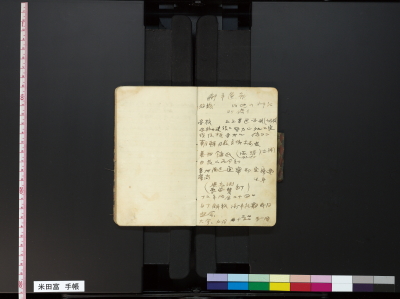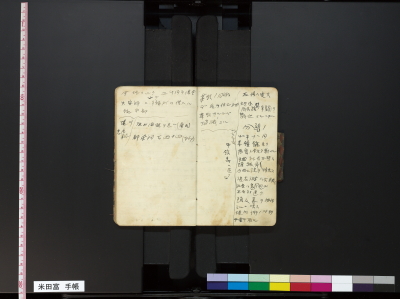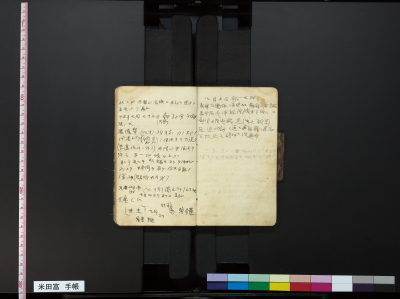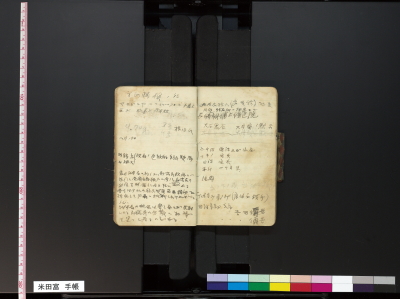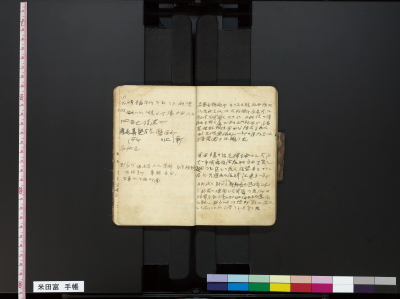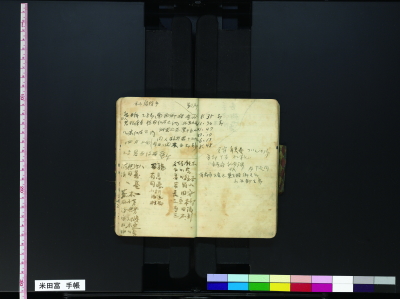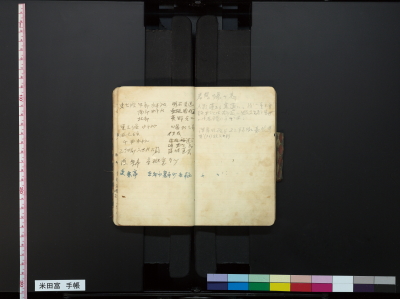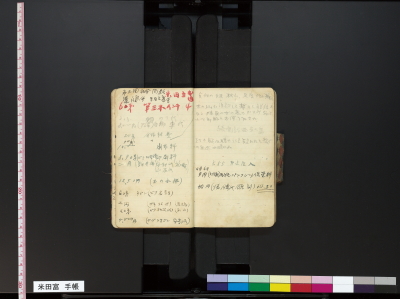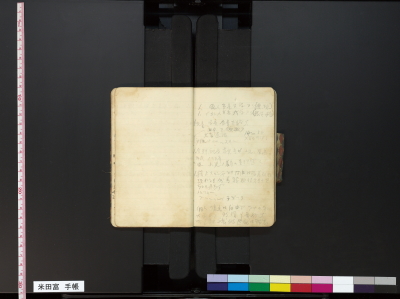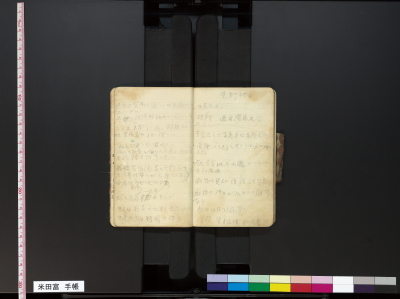Pocketbook of YONEDA Tomi (1924)
YONEDA Tomi, one of the founders of the Zenkoku Suiheisha, recorded how
and by whom the Hyeongpyengsa was created as well as what cases of discrimination
the former Baegjeong had faced in his diary for the year 1924.
According to his records, the Hyeongpyengsa was not well-organized compared to the Zenkoku Suiheisha and the police was tolerant in terms of the control over the organization because the authorities welcomed strife among the Korean people. He also wrote that, although a wealthy person who belonged to the former Baegjeong provided support for the construction of a school, his child was denied admission into the school. This incident led to the creation of the Alliance to Seek for the Establishment of the Hyeongpyengsa for the Liberation of the former Baegjeong in April 1924, initiated by Kang Sangho and Jang Jipil. He also noted the address of IHARA Hisashige of the Oita Prefectural Suiheisha, who lived in Seoul at the time, and referred to the assault on the Hyeongpyengsa (the Jecheon incident) in September 1923 and how the organization broke up after the incident. He stated that Jang Jipil was a graduate of the Meiji University in Japan and wrote down the name of Kim Gyeongsam, who came to Japan in September 1924 for establishing solidarity with the Zenkoku Suiheisha.
It is evident that his strong interest in the Hyeongpyengsa formed the foundation of the exchanges and solidarity between the two organizations.
[ BACK | 01 | 02 | 03 | 04 |
05 | 06 | 07 | 08 | NEXT ]
According to his records, the Hyeongpyengsa was not well-organized compared to the Zenkoku Suiheisha and the police was tolerant in terms of the control over the organization because the authorities welcomed strife among the Korean people. He also wrote that, although a wealthy person who belonged to the former Baegjeong provided support for the construction of a school, his child was denied admission into the school. This incident led to the creation of the Alliance to Seek for the Establishment of the Hyeongpyengsa for the Liberation of the former Baegjeong in April 1924, initiated by Kang Sangho and Jang Jipil. He also noted the address of IHARA Hisashige of the Oita Prefectural Suiheisha, who lived in Seoul at the time, and referred to the assault on the Hyeongpyengsa (the Jecheon incident) in September 1923 and how the organization broke up after the incident. He stated that Jang Jipil was a graduate of the Meiji University in Japan and wrote down the name of Kim Gyeongsam, who came to Japan in September 1924 for establishing solidarity with the Zenkoku Suiheisha.
It is evident that his strong interest in the Hyeongpyengsa formed the foundation of the exchanges and solidarity between the two organizations.
Pocketbook of YONEDA Tomi 11
Hyeongpyeng Movement
Organization Not well-organized compared to the Zenkoku Suiheisha
School Public regular school (elementary school)
Because of having had provided support for the construction of the school but was
denied admission after the completion
Director of the Gyeongseong Branchi, Josunilbo
Mr. Kang Sangho (Yangban [aristocrat]) (Shizoku [warrior class])
Manager, Japan Hanayama Firm
Gyeongsangnam-do Uiryeong-gun Uiryeong-myeon
Born in Gyeongsang
Jang Jipil and Lee Hakchan, Baegjeong
24 April 12 [the year 1924]
Alliance to Seek for the Establishment of the Hyeongpyengsa for the Liberation of the
former Baegjeong
Congress, 13 May, the first one
Day 5
Organization Not well-organized compared to the Zenkoku Suiheisha
School Public regular school (elementary school)
Because of having had provided support for the construction of the school but was
denied admission after the completion
Director of the Gyeongseong Branchi, Josunilbo
Mr. Kang Sangho (Yangban [aristocrat]) (Shizoku [warrior class])
Manager, Japan Hanayama Firm
Gyeongsangnam-do Uiryeong-gun Uiryeong-myeon
Born in Gyeongsang
Jang Jipil and Lee Hakchan, Baegjeong
24 April 12 [the year 1924]
Alliance to Seek for the Establishment of the Hyeongpyengsa for the Liberation of the
former Baegjeong
Congress, 13 May, the first one
Day 5
Pocketbook of YONEDA Tomi 12
[Left]
Having borrowed 3,000 yen for the venue and
rented office at Daeang-dong
General Headquarters: Jecheon, Chungcheongnam-do
Create the alliance for obstruction (common people)
144 Doryeom-dong (head office)
[Right]
Named for the purpose of innovation, but cease to exist but for innovation
“Branch Director, Sin Hosu, will resign”
Police is tolerant
Reason:
Because they welcome strife among the same [Korean] race
Breaking up [of the organization]
November 12 [the year 1924]
Kang Sangho came and recommended to meet high officials; President of Gyeongseongilbo supported the idea; Jo Uje proposed distribution
Jang Jipil disagreed; President shared the idea and decided to withdraw
Decided to expel Jo and Kang; they came and took the money when the Jecheon incident happened
Having borrowed 3,000 yen for the venue and
rented office at Daeang-dong
General Headquarters: Jecheon, Chungcheongnam-do
Create the alliance for obstruction (common people)
144 Doryeom-dong (head office)
[Right]
Named for the purpose of innovation, but cease to exist but for innovation
“Branch Director, Sin Hosu, will resign”
Police is tolerant
Reason:
Because they welcome strife among the same [Korean] race
Breaking up [of the organization]
November 12 [the year 1924]
Kang Sangho came and recommended to meet high officials; President of Gyeongseongilbo supported the idea; Jo Uje proposed distribution
Jang Jipil disagreed; President shared the idea and decided to withdraw
Decided to expel Jo and Kang; they came and took the money when the Jecheon incident happened
Pocketbook of YONEDA Tomi 13
[Left]
Argument is made for breaking up the organization and being headquartered at Gyeongseong
23 July 13 [the year 1925] (Daejon) Meeting of principal members
Father of Jang
Jan Deogchan (72 years old); became a representative of 71 counties 37 years ago and was insistent on using Mang-gong [Korean headband]
(Appealed to Mr. Lee Gojun) he was sympathetic and allowed to use it; the primary achievement
Upon the arrival of the new Mayor, he was tortured on the pretext that the permission had been given by way of corruption; a number of injuries can be observed on his body now (Mr. Jan [Jipil] is a graduate of Meiji University)
163 Nanzan-cho, Daegu-myeon (the population of 100,000)
Meiji-cho 2 chome, within the city: Branch
Mr. Kim Gyeongsam
“Segwang” July and after Financial matters: O Seonggwan
* [unable to make out] Gyeongsik
[Right]
5 August, 7:00 in the evening
Six Korean organizations held a public meeting to condemn suppression of oratorical meetings by Koreans
Police suppression got tougher (suspension order and arrest); very much doubtful if suppression could lead to ** [unable to make out] of the movement by Koreans
Argument is made for breaking up the organization and being headquartered at Gyeongseong
23 July 13 [the year 1925] (Daejon) Meeting of principal members
Father of Jang
Jan Deogchan (72 years old); became a representative of 71 counties 37 years ago and was insistent on using Mang-gong [Korean headband]
(Appealed to Mr. Lee Gojun) he was sympathetic and allowed to use it; the primary achievement
Upon the arrival of the new Mayor, he was tortured on the pretext that the permission had been given by way of corruption; a number of injuries can be observed on his body now (Mr. Jan [Jipil] is a graduate of Meiji University)
163 Nanzan-cho, Daegu-myeon (the population of 100,000)
Meiji-cho 2 chome, within the city: Branch
Mr. Kim Gyeongsam
“Segwang” July and after Financial matters: O Seonggwan
* [unable to make out] Gyeongsik
[Right]
5 August, 7:00 in the evening
Six Korean organizations held a public meeting to condemn suppression of oratorical meetings by Koreans
Police suppression got tougher (suspension order and arrest); very much doubtful if suppression could lead to ** [unable to make out] of the movement by Koreans
